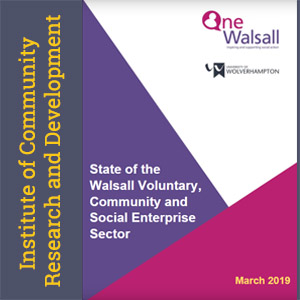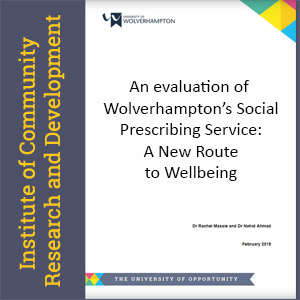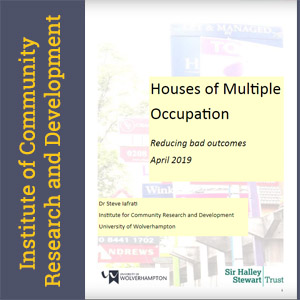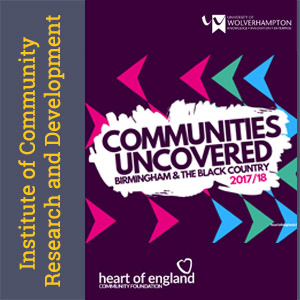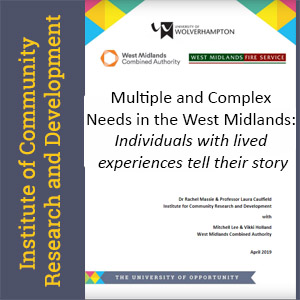
Inequality and Social Analysis
ICRD’s work in this area aims to map and understand inequality in the West Midlands and further afield, working with individuals and communities to tackle disadvantage and address it. With a focus on co-production and peer-led work, we work with a range of partners across civil society,particularly the voluntary and community sector. Recent partners include:
- West Midlands Combined Authority
- Walsall Council and Wolverhampton Council
- BVSC
- Heart of England
- Changing Lives
Research in this area led, in autumn 2020, the WMCA to call for £11 million from the government to sustain the voluntary, community, faith and social enterprise organisations that support the most vulnerable in communities. The Mental Health Listening Exercise will infrom the WMCA's forthcoming mental health commision in 2022.
ICRD research staff associated with this theme:
Current projects
Improving mental wellbeing has the potential to change lives, impacting on health, work and social relationships. It generally relates to enjoyment of life, ability to cope with every-day pressures, setting and fulfilling goals and having the capability to build and maintain relationships with others. The importance of empowering communities is also recognised as they provide fundamental foundations for a supportive environment that enables individuals and families to thrive and maintain or improve their mental wellbeing.
Commissioned by Walsall Council, Dr Rachel Hopley and Dr James Rees are working with colleagues in Psychology (Dr Darren Chadwick) and BVSC to understand how factors influence mental wellbeing in Walsall. The aim of the research is to provide a rich insight into how various factors play a role in mental wellbeing and highlight what has helped or hindered individuals’ and communities’ ability to maintain positive mental wellbeing. In particular, the research aims to provide insight into the complexities that have led to inequality in unemployed residents and residents with caring responsibilities.
Birmingham City Council has committed to a “Prevention First” vision of Birmingham where “citizens lead healthy, happy, independent lives within their own homes and communities”. This vision underpins a new approach to commissioning prevention based services and activities in the Adult Social Care Directorate, a significant shift within the local authority which previously since 2010 had been on a programme of savings on all non-essential, non-statutory spend.
ICRD and BVSC have been commissioned by Birmingham City Council to review the Adult Social Care Prevention Portfolio evaluation framework.
This is a qualitative research project funded by Walsall Council, to work collaboratively with senior staff at the Council in order to take stock of the response to the Covid-19 pandemic, to assess what has happened so far, to identify future strategic priorities, and to share lessons learned that can help Walsall to build on in its successful partnership arrangements.
With BVSC and Revolving Doors Agency, Dr James Rees, ICRD Reader and Deputy Director, has been investigating the COVID-19 vaccine uptake amongst people facing multiple disadvantage in Birmingham. The report outlines what messages help to ensure that people facing multiple disadvantage are provided with the information and tools to ensure that they can make an informed decision about the vaccine into the future. Both reports will be published in October and will be available on the ICRD website.)
ICRD has recently completed, with partners BVSC and Coventry University, a 'Listening Exercise’ on behalf of West Midlands Combined Authority. It engaged with a wide variety of voluntary, community and faith organisations across the region, with a particular focus on the various inequalities exposed and exacerbated by the COVID-19 pandemic. The community perspectives on potential areas of focus will inform the forthcoming Mental Health Commission.
New Publication
We are proud to share to share our latest publication, 'An evaluation of Changing Lives’ Iris project'
Changing Lives are the largest provider of support for women who sell sex in the UK. Changing Lives’ approach is trauma-informed, recovery-focused and gender-specific. The aim is to help women break cycles of chaos by giving them the tools they need to achieve positive, sustainable change through a three-stage model of change: Being - Reaching Out and Engagement; Becoming - Recovery and Resilience; and Belonging - Community Integration.
Dr Rachel Hopley, Dr Bozena Sojka and Professor Laura Caulfield worked with Changing Lives to evaluate the Iris project, explore the impact, how the project has evolved and how it’s been implemented across Walsall and Wolverhampton, including in light of the COVID-19 pandemic.


/prod01/wlvacuk/media/departments/media-and-communications/images-18-19/220325-Engineers_teach_thumbail.jpg)
/prod01/wlvacuk/media/departments/media-and-communications/images-18-19/BBR_logo_large.jpg)
/prod01/wlvacuk/media/departments/media-and-communications/images-18-19/Wolves-Story-Thumb.jpg)
/prod01/wlvacuk/media/departments/media-and-communications/images-18-19/220505-BAS9-School-Showcase-Resized.jpg)
/prod01/wlvacuk/media/departments/business-solutions/images/banners/business-we-back-you-500x250.jpg)
